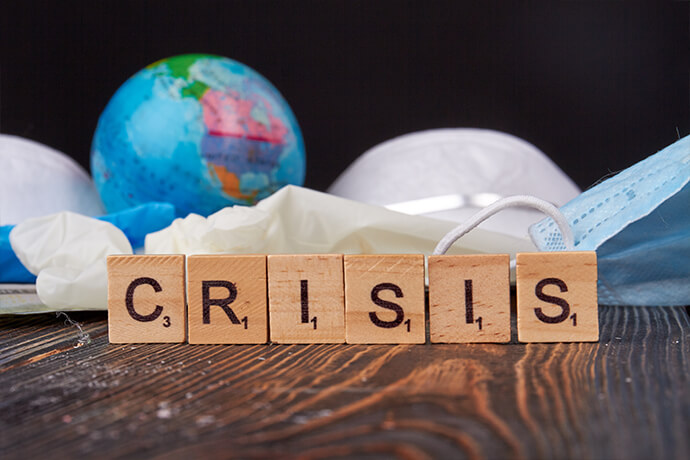 SPEAKERS
SPEAKERS
 TOPICS
TOPICS
Recent challenges—from revenue losses to new work paradigms—underscore the need for effective leadership. Leaders must navigate uncertainty and address challenges to steer organizations forward.

Leadership goes beyond just overseeing and directing – it's about inspiring and guiding a team towards success. If you find yourself in a leadership role, understanding the intricacies of leadership is crucial for your effectiveness.
In recent months, leaders across various organizations have faced the daunting challenge of steering their businesses through unprecedented challenges. It is from revenue losses and low morale to fear, uncertainty, and new ways of working.
The road ahead remains uncertain, requiring leaders to work diligently to alleviate these challenges' impact.
How do they tackle these issues? Let's explore leadership in times of crisis in this post…

Leaders find themselves in a constantly evolving emergency, not a one-off event, demanding swift agility, foresight, and a shift in organizational mindset. Deloitte outlines three phases of crisis response:
Resilient leadership in a crisis is characterized by who they are and what they do:
Who they are:
What they do:

Self-awareness is the cornerstone of adaptive leadership in times of crisis. It's all about knowing yourself inside and out. Resilient leaders understand their strengths and weaknesses and how their emotions can sway their decisions.
They use this insight to keep their cool when things get rough and to handle stress like pro. When you are self-aware, leaders can pinpoint what throws them off balance and plan to deal with it better next time.
Amidst the chaos, it's easy to focus solely on survival. But leaders emerge in times of crisis know better. They tap into their core purpose and values, using them as guiding stars in stormy seas.
When decisions and actions align with their beliefs, it's like fuel for their fire, keeping them motivated and driven. Having a clear sense of purpose isn't just a nice to have—it's essential for weathering storms and conquering challenges head-on.
Don't let self-care feel like just another task on your to-do list. It's more than just a chore—it's a vital part of staying healthy and happy, especially during stressful times at work. I learned this the hard way after a car accident left me with a broken back on my way to the office. It made me realize that taking care of myself should be a daily priority.
According to the National Institute of Mental Health, self-care isn't just about pampering—it's about managing stress, staying healthy, and boosting your energy levels. Even the smallest acts of self-care can make a big difference in your overall well-being. So don't underestimate the power of taking time for yourself each day—it's worth it!
In crisis leadership, self-regulation takes the spotlight as the key characteristic. Resilient leaders excel in controlling their emotions and reactions, even when faced with challenging situations.
They steer clear of letting emotions drive impulsive decisions, opting instead for a thoughtful approach. Taking a moment to step back, assess the situation, and formulate a well-thought-out plan becomes their modus operandi.
Mistakes are inevitable, but resilient leaders excel in self-correction, a challenging feat under stress. The practice of self-regulation ensures they refrain from making hasty decisions that could haunt them later.
Reflect on a time when impulsivity led to less-than-ideal outcomes—it happens to the best of us. However, leaders can steer towards more favorable results by embracing self-regulation and pausing for thoughtful consideration.
In tough times, leaders often find themselves standing alone against the storm. Everyone looks to them for strength, solutions, and support, expecting them to be unwavering in adversity.
But this pressure can take its toll, leaving leaders feeling vulnerable and anxious. If left unchecked, this stress can lead to burnout.
However, there's a simple remedy: avoiding isolation. Leaders can break free from loneliness by reaching out to peers and mentors. It's a chance to swap ideas, brainstorm solutions, offer support, and share resources.
Plus, it's a reassuring reminder that they're not alone—others are facing similar challenges and can offer valuable insights and encouragement.
Flexibility is a key trait of resilient leadership. It means rolling with the punches and adjusting plans as needed. Resilient leaders don't cling to their original ideas like they're set in stone; they're quick to adapt and embrace change. This skill allows them to seize new opportunities and tackle unexpected hurdles head-on.
Research backs this up, too. Gary Yukl, a management professor, dug into decades of studies and concluded that flexibility is vital for effective leadership. Whether navigating a crisis or seizing a chance for growth, being flexible sets great leaders apart.
Talking through your concerns with someone you trust can help ease the stress and anxiety that often accompany difficult situations at work. Building strong relationships with your coworkers is key, as they can provide valuable advice and perspective during challenging times.
When you've established trust and open crisis communication with your colleagues, they'll understand that everyone makes mistakes and will be more willing to collaborate on finding solutions. It's essential to nurture these connections even when things are going smoothly, as having a supportive network can make all the difference when facing a crisis.
Facing stressful situations is par for the course, but keeping cool during a crisis sets great leaders apart. It's during these tough times that the true mettle of both the team and its leaders is put to the test.
The role of a leader is crucial in going through challenging times. Employers highly value individuals with strong leadership skills and a clear grasp of their responsibilities. This makes effective leadership a prized asset in any organization.
If you're looking to empower and motivate your employees, reach out to The Speaker Agency for expert guidance and support. Let's work together to bring out the best in your team.